|
|
|
Sort Order |
|
|
|
Items / Page
|
|
|
|
|
|
|
| Srl | Item |
| 1 |
ID:
107801
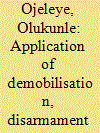

|
|
|
|
|
| Publication |
2011.
|
| Summary/Abstract |
The oil- and gas-rich Niger Delta region, plagued by violence and dominated by armed militant gangs, typifies the new face of conflict which second generation demobilisation, disarmament and reintegration (DDR) approaches are meant to address at the sub-national level. Fundamental to the emergence of militant gangs and the militarisation of civil society in Nigeria is the federal system of government and its attendant political, social and economic imbalances. This article advances the argument that the implementation of a detailed DDR programme that addresses the governance, ethnic politics, resource control, revenue distribution and national integration issues at the root of the tensions in the troubled oil- and gas-rich region will yield a greater peace dividend for all stakeholders in contrast to the current amnesty programme of the Nigerian government. This programme has been fraught with setbacks and mistrust from its client group (the militants). In so doing, DDR at the sub-national level in the Niger Delta would serve as a tool to achieve peace and long-term stability in the nation not only by removing the tools of violence - weapons and ammunition - from the militants and the civilian population but also by removing the sources of violence as reflected in socio-economic and political inequality within the Nigerian state.
|
|
|
|
|
|
|
|
|
|
|
|
|
|
|
|
| 2 |
ID:
113212
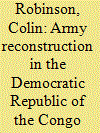

|
|
|
|
|
| Publication |
2012.
|
| Summary/Abstract |
Since the peace agreements of 2002-2003 which ended the second war in the Democratic Republic of Congo, reconstruction of the army has been an inherently political process, in common with other attempts to carry out security sector reform (SSR). This article briefly sketches out the Congolese army's history, then attempts to fill a gap in the literature on Congolese SSR by detailing what can be found of the actual structure and shape of the present army. The efforts that have been made to reform the army are then examined, followed by a conclusion which examines the major issues and possible ways forward.
|
|
|
|
|
|
|
|
|
|
|
|
|
|
|
|
| 3 |
ID:
153971
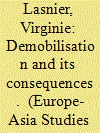

|
|
|
|
|
| Summary/Abstract |
The aftermath of the 2011–2012 Russian social movement Za chestnye vybory (For Fair Elections) challenges the common assumption that sees mass mobilisation as leading to positive outcomes for civil society. This article argues that the movement, by failing to institutionalise cooperative ties and secure popular support, had ambiguous outcomes for civil society. While repression surely played a role in this outcome, choices made by movement leaders during demobilisation should not be overlooked: one part of the movement became radicalised while another made a premature attempt to enter formal politics, thus hindering the movement’s later attempt to institutionalise.
|
|
|
|
|
|
|
|
|
|
|
|
|
|
|
|
| 4 |
ID:
097658
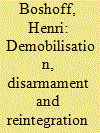

|
|
|
|
|
| Publication |
2009.
|
| Summary/Abstract |
This article surveys disarmament, demobilization and reintegration (DDR) efforts in the Democratic Republic of Congo (DRC), focusing on initiatives by the Forces Démocratiques pour la Libération du Rwanda (FDLR) and the Congrès National pour la Défense du Peuple (CNDP).
|
|
|
|
|
|
|
|
|
|
|
|
|
|
|
|
| 5 |
ID:
072903


|
|
|
|
|
| Publication |
2006.
|
| Summary/Abstract |
Militias in Iraq were not effectively demobilised or disarmed because the American occupation forces did not apply lessons from previous experience. The United States did not develop a comprehensive plan for addressing all armed groups, but tried to disarm groups before a full political settlement was reached and accepted, and did not include a neutral arbiter such as the United Nations. Militia disarmament thus failed in Iraq. The failure to apply lessons from the past was compounded by the fact that demobilisation was attempted in a situation where no group fully accepted either the occupation government or the nascent Iraqi state. This failure allowed Iraqi security institutions to be infected by paramilitary groups, heightening the extent of civil conflict.
|
|
|
|
|
|
|
|
|
|
|
|
|
|
|
|
| 6 |
ID:
154376
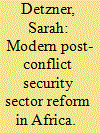

|
|
|
|
|
| Summary/Abstract |
This piece examines recurring patterns in the ‘where’ and ‘how’ of security sector reform (SSR) implementation failures in post-conflict African SSR programmes featuring substantial external involvement that have been undertaken since the mid-1990s. It finds, briefly that in these efforts, gaps in SSR implementation have tended to occur at the same points in the SSR process repeatedly. The most common issues include failures to correctly assess the post-conflict security environment, failures to ensure local ownership of reform efforts, failures to devote sufficient resources and attention to disarmament, demobilisation and reintegration (DDR, a process with close ties to SSR and force integration), failures by donors to coordinate goals and resources, and failures to include critical parts of both the de jure and de facto security sector in reforms. Post-conflict African success stories also share common characteristics, most notably a deep and wide level of societal involvement at most stages of the SSR process. These patterns, analysed as a necessary first step to discovering the ‘why’ of implementation failures in such cases, collectively suggest a focus on the early mobilisation of domestic political demand for SSR, rather than on varying methods of applying external pressure, as a fruitful avenue for future research.
|
|
|
|
|
|
|
|
|
|
|
|
|
|
|
|
| 7 |
ID:
124490
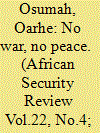

|
|
|
|
|
| Publication |
2013.
|
| Summary/Abstract |
The armed conflict over crude petroleum oil in the Niger Delta has raged for several decades. A host of peace initiatives have been adopted by the Nigerian state to address it, but with minimal impact. The amnesty offer to repentant militias in 2009 by President Umaru Yar'Adua's administration is one of the most recent and broadest peace initiatives by the Nigerian government intended to end the general tendency to warfare and the absence of peace in the Niger Delta. This article, based on secondary sources of data, examines the components of the amnesty, its critical problems and their implications for peacebuilding in the Niger Delta. It finds that though the programme has engendered relative peace, the issues and grievances that occasioned the general tendency to warfare and absence of peace in the region - such as inequitable distribution of oil revenue, environmental degradation, and underdevelopment - are not properly articulated in the disarmament, demobilisation, and reintegration components of the programme. Thus, it holds that the prevailing situation in the region largely approximates a swinging pendulum of no war, no peace.
|
|
|
|
|
|
|
|
|
|
|
|
|
|
|
|
|
|
|
|
|